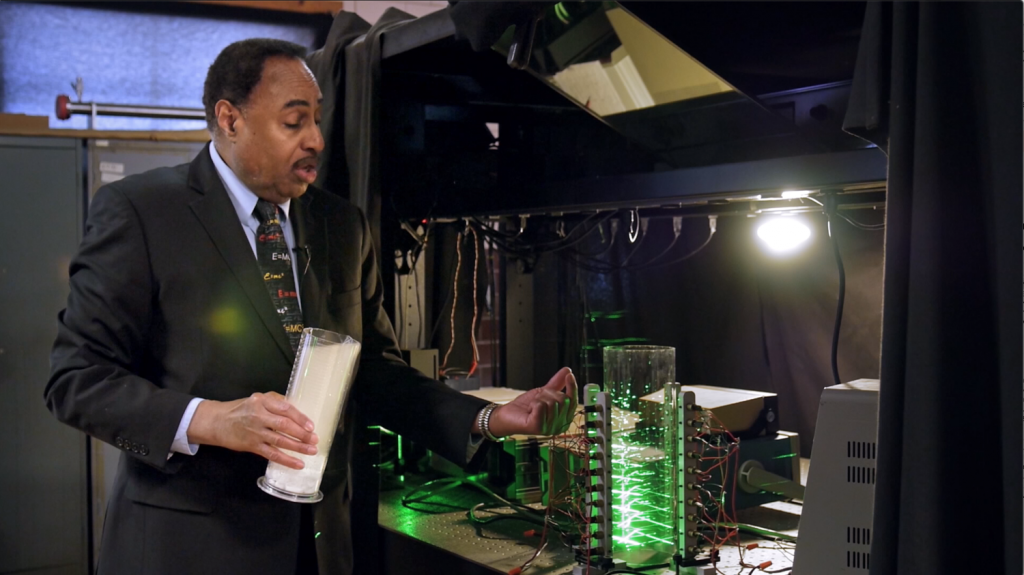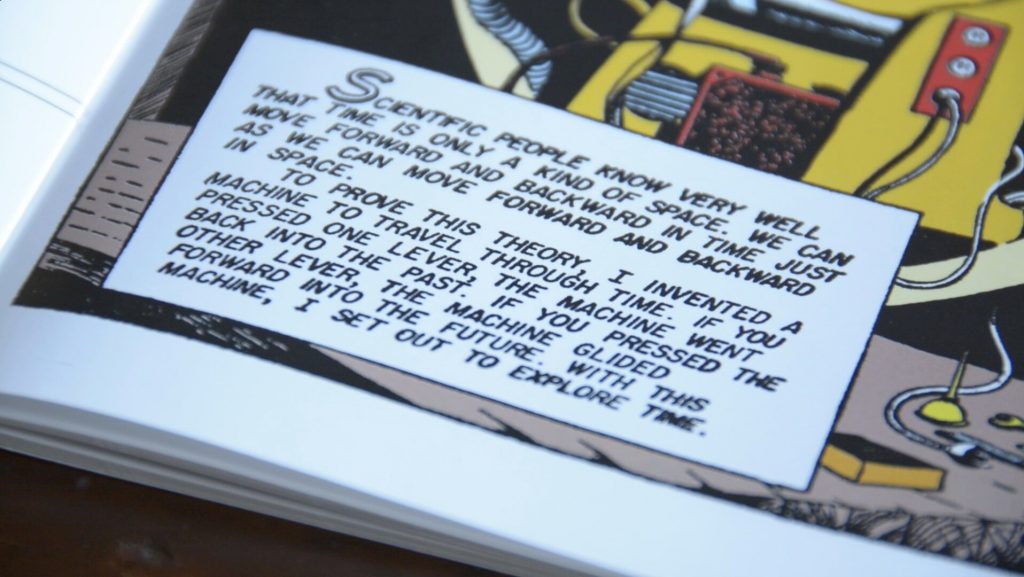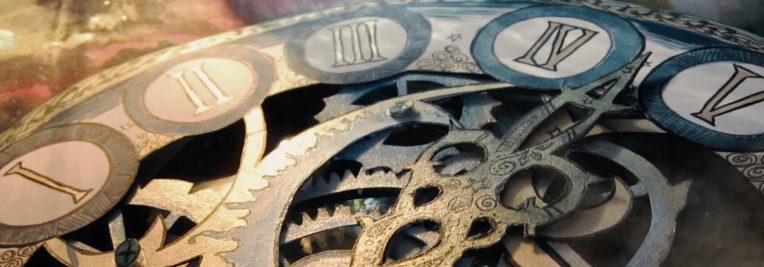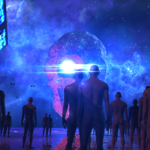Days before widespread lockdowns were implemented, the Philip K Dick Film Festival was able to go ahead in New York and bring another batch of talented independent filmmakers to our attention. You can see the full list of this year’s award winners here, as well as our interview with the festival founder and a review of one of the short films American Quartet.
Today, I’m pleased to review for you the winner of the Best Documentary category: A Brief History of Time Travel. Produced and directed by Gisella Bustillos in her feature-length debut coming in at 68min.
Opening with the packed crowds of Comic Con (now an anxiety inducing sight to behold), the documentary explores literary, scientific, spiritual and media-driven depictions of time travel in its many different forms. From Doctor Who fandom to the ancient Hindu scripture of the Mahabharata, the film shows that concepts of traversing time in non-linear ways are a common mythological element in the stories we tell; regardless of geography or the religious and philosophical underpinnings of different civilisations.
Concepts of time itself have varied and shifted around the world, which makes for an engaging opening. Measuring time, scheduling time, saving time, purchasing the time of others… we easily forget just how much our lives are dictated by the relativity bubble we exist within. It’s also interesting to be reminded of how often our time travel narratives rely on some form of technology or machinery.
Time travel is often a form of futurist, technological mythology that is particularly resonant in a post-industrial age but becomes almost surreal once we begin to enter our post-digital era. The time travel machines that dominated early science fiction literature (from Enrique Gaspar to the well-known H.G. Wells) are juxtaposed against the theoretical world of wormholes and attempts at life extension such as cryogenics. We’re presented here with a broad notion of ‘time travel’ in order to explore the many different ways people relate to the phrase.
The great animations that accompany the different stories, theories and history presented throughout are a highlight, emphasising the creative elements of a complex topic when considered from a scientific or philosophical perspective. Varied art styles are interspersed with movie clips and archival footage in what becomes a treasure trove of time travel media. Much of the opening half is spent in these creative areas; showing how time travel combines the magical and the material, scientific and fantastic in what becomes an analogy for social progress, personal connectivity and scientific advancement.
There are also deep connections with the human desire for control, with time being something that we can’t inherently wield mastery over but might yet become malleable through human endeavour. These are connections that I hadn’t properly appreciated before watching A Brief History of Time Travel and are an example of the way in which the film brings new perspectives to a familiar topic.

The machinery of time travel starts as a utility of science fiction, but there’s also a prophetic element that begins to mirror advancements in theoretical physics. This kind of futurist prediction, both in the mechanisms of time travel but also in the futures discovered through its use, creates a magnetic allure around time travel as a synthesis of mythology and science. Time is the foundation of the human experience and breaking its boundaries therefore becomes the core of our yearning for liberation and enlightenment.
Many of the paradoxes and questions surrounding time travel are considered. Can you travel back into the past as well as forward into the future? Can your actions in the past negate your existence (the Grandfather Paradox)? Is time travel one directional, or can you jump back and forth? Could it warn us of future disasters or provide solutions to problems we face today?
Three primary theories are presented (dynamic, fixed and multiverse timelines) in a visually engaging and easily followed manner. The film also questions the notion that time is real at all, as evidenced in many religious traditions that see time as an illusion. Understandings of the eternal and infinite, whether they be spiritual or scientific, deconstruct what we generally understand as time and render it nearly meaningless. This makes the concept of time travel a much broader topic in praxis than it might at first seem, which the film does a good job of unpacking.
These strong metaphysical foundations are found throughout, but there is a short section in the middle that momentarily devolves into anecdotal musings from a few who practice meditation or new age regression therapy. Some of the interview sources aren’t up to poignantly touch on the topic of shamanism without feeling overly reductive; nor holistically link the spiritual, philosophical and scientific facets of time travel. For a brief moment, it comes across as a shallow reduction of deep metaphysical concepts into simple consumerist soundbites about our imaginative capacity. Thankfully, this part of the documentary only lasts a few minutes and soon returns to its sophisticated content overall.
It’s difficult to balance all the different approaches that people take to concepts of time and how we relate to it, whether they be more literal (such as viewing light from the universe as a window into the past), metaphysical or technological. One aspect that could have been included are the ethical questions about time travel, which have huge implications for the way we approach the concept. It would have been great to see a section on the more negative aspects of time travel, but there’s only so much that can be included. A Brief History of Time Travel otherwise maintains a good balance throughout its 68min running time, opening up new avenues of thinking while providing a great overview of the topic for those who might be new to the concepts involved.

Tracking the evolution of time travel in both our narrative and scientific spheres allows us to better understand the symbiotic relationship between the two and how our creative world influences and is then influenced by our scientific endeavours. Taking this approach also highlights how science is often as malleable and shifting as the stories we tell about ourselves, with the same kind of wonder and exploration at its core that drives people forward into new areas of discovery and expression.
The team have brought together some interesting names for an independent film, including Bill Nye and Tim Schafer, combining familiar faces with the selection of academics needed to provide credibility. Apart from the aforementioned moment where this diverse mix of viewpoints leads to a few misfired interviews, the variety presented really does give an effective (brief) overview of not just the history of time travel; but also the many different ways that the concept might be considered both theoretically and in practice.
A Brief History of Time Travel is another great success of independent filmmaking showcased at the Philip K Dick Film Festival that should be applauded and widely viewed. Although it leaves you wanting more, there are plenty of fruitful avenues included for those interested in further exploration. From a seemingly simple title a great deal of depth emerges, often in ways that are inspiring and creatively stimulating for the viewer. These ideas are brought to life with the stimulating visual backdrop that a topic of this kind requires to be communicated effectively.
Time travel is about the boundaries of the human condition as much as it is the workings of the universe. This film is a great love letter not just to science, but also to our creative minds, metaphysical lives and technological dreams of the future. Whether or not time travel is possible in the manner that science fiction presents us with, considering the possibility opens us up to think of ourselves more creatively in relation to the events and mechanisms of the cosmos around us.
As one of the computer scientists interviewed in the film states: “It’s more fun to imagine a world in which things like time travel could happen, someday.”
Gisella Bustillos and her team deserve high praise for this feature-length debut and it’s great to see the film getting the recognition it deserves on the festival circuit. Unfortunately, the current global pandemic has meant that this circuit is on indefinite hiatus. For now, you can find out more information about potential screenings from October onwards and/or purchase a copy on the film’s website.
Images used with permission, © Majesta Pictures 2019





